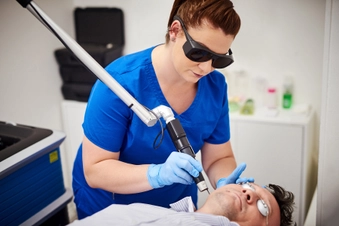Living Optimistically with Vitiligo

Choose Your Own Path
“We are fortunate to have more research looking into different treatment options for vitiligo, [including] oral, topical, and light treatments. But if you don't want to treat it, you don’t have to. Celebrities and models with vitiligo are working to build continued awareness to help embrace the beauty of all skin types and skin conditions, including vitiligo.”
- Marisa Garshick, MD, dermatologist, MDCS Dermatology, New York City

Learn All You Can
“We are now in a time of great progress in the area of vitiligo. In order to make the journey better, educate yourself on the advances in the area, and feel confident that help is on the way.”
- Jeffrey M. Weinberg, MD, assistant clinical professor of dermatology, Columbia University College of Physicians and Surgeons

Plug Into a Network
“Vitiligo is very mentally and physically taxing. Vitiligo Research Foundation is a great resource for learning about new treatments, staying up to date about vitiligo events and activities, and reading stories about others with the potential to make friends and find options for your disease.”
- Karan Lal, DO, member, Society for Pediatric Dermatology; dermatologist, Northwell Health

Find Community
“There's something transformational about finding other people with vitiligo who share your story. It's the one thing that has fundamentally changed the way I live with this condition and helped me find confidence and peace. Whether it's a blog, support group, Instagram page, or just one other person, that connection can spark a surprising amount of change in your life.”
- Erika Page, founder/editor, Living Dappled

Ground Yourself in the Good
“Always stay positive, and focus on your strengths and goals!”
- Bassel H. Mahmoud, MD, PhD, associate professor of dermatology, University of Massachusetts Medical School; director, UMass Vitiligo Clinic and Research Center

Consider Laser Treatment
“A very important part of the treatment for vitiligo is the excimer laser. This laser stimulates melanocyte growth and pigmentation. It’s a must as part of the vitiligo treatment protocol.”
- Cameron Rokhsar, MD, associate clinical professor of dermatology, Mount Sinai Hospital

Empower Yourself Through Connection
“Vitiligo support groups are extremely empowering, and they’re a great vehicle for sharing information about vitiligo, the various treatments, and how to live with vitiligo. You can speak to people who know what you’ve been going through, who can offer advice based on similar experiences.”
- Richard Huggins, MD, dermatologist, Vitiligo Research and Treatment Center, Henry Ford Hospital; community chair, Global Vitiligo Foundation

Look Beyond Your Skin
“Don't let your condition define who you are as a person.”
- Mark Braxton, Raleigh, NC

Have Good Care
“The best first step is to find a dermatologist that you feel comfortable with and supported by. Like any other chronic disease, your relationship with your physician will be long-term, so you want to make sure you find a dermatologist you like. Don’t be shy to ask questions and express your concerns and your feelings. Remember, we want to help you!”
- Heidi Goodarzi, MD, dermatologist, Newport Beach, CA
Show Sources
IMAGES PROVIDED BY:
1) LOIC VENANCE / Getty Images
2) LL28 / Getty Images
3) Oscar Wong / Getty Images
4) FG Trade / Getty Images
5) FG Trade / Getty Images
6) Charday Penn / Getty Images
7) Halfpoint Images / Getty Images
8) Delmaine Donson / Getty Images
9) Westend61 / Getty Images
SOURCES:
Marisa Garshick, MD, dermatologist, MDCS Dermatology, New York City.
Jeffrey M. Weinberg, MD, assistant clinical professor of dermatology, Columbia University College of Physicians and Surgeons.
Karan Lal, DO, member, Society for Pediatric Dermatology; dermatologist, Northwell Health.
Erika Page, founder/editor, Living Dappled.
Bassel H. Mahmoud, MD, PhD, associate professor of dermatology, University of Massachusetts Medical School; director, UMass Vitiligo Clinic and Research Center.
Cameron Rokhsar, MD, associate clinical professor of dermatology, Mount Sinai Hospital.
Richard Huggins, MD, dermatologist, Vitiligo Research and Treatment Center, Henry Ford Hospital; community chair, Global Vitiligo Foundation.
Mark Braxton, Raleigh, NC.
Heidi Goodarzi, MD, dermatologist, Newport Beach, CA.